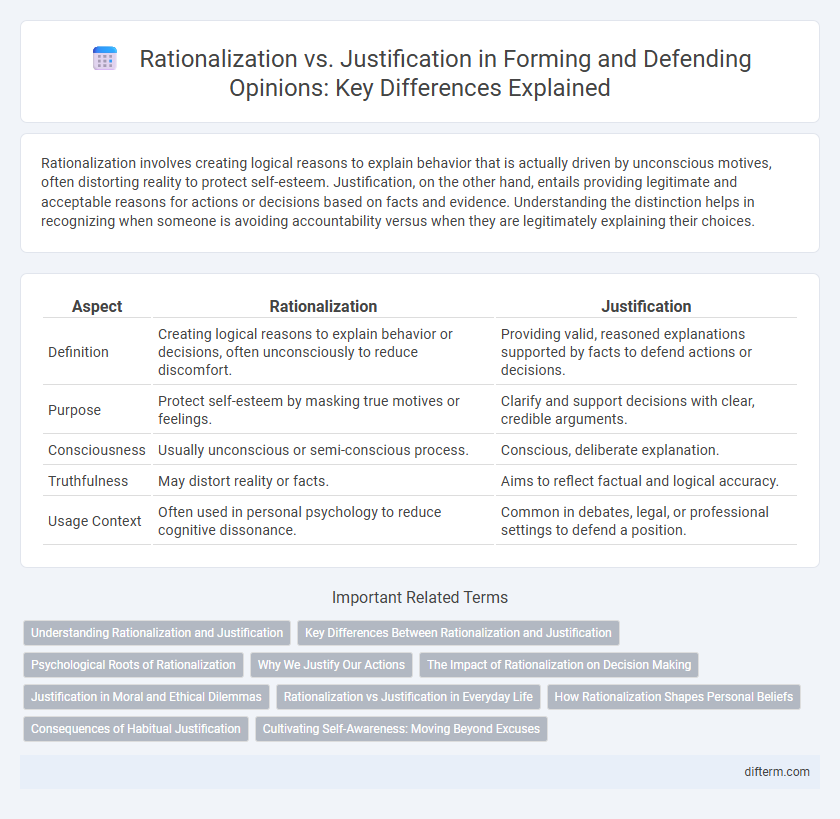Rationalization involves creating logical reasons to explain behavior that is actually driven by unconscious motives, often distorting reality to protect self-esteem. Justification, on the other hand, entails providing legitimate and acceptable reasons for actions or decisions based on facts and evidence. Understanding the distinction helps in recognizing when someone is avoiding accountability versus when they are legitimately explaining their choices.
Table of Comparison
| Aspect | Rationalization | Justification |
|---|---|---|
| Definition | Creating logical reasons to explain behavior or decisions, often unconsciously to reduce discomfort. | Providing valid, reasoned explanations supported by facts to defend actions or decisions. |
| Purpose | Protect self-esteem by masking true motives or feelings. | Clarify and support decisions with clear, credible arguments. |
| Consciousness | Usually unconscious or semi-conscious process. | Conscious, deliberate explanation. |
| Truthfulness | May distort reality or facts. | Aims to reflect factual and logical accuracy. |
| Usage Context | Often used in personal psychology to reduce cognitive dissonance. | Common in debates, legal, or professional settings to defend a position. |
Understanding Rationalization and Justification
Rationalization involves creating seemingly logical explanations for behaviors or decisions driven by unconscious motives, often masking true intentions to reduce cognitive dissonance. Justification, in contrast, provides factual or moral reasons that openly support actions or beliefs, aiming for transparency and acceptance. Understanding these distinctions clarifies how individuals align their internal beliefs with external actions, influencing accountability and self-awareness.
Key Differences Between Rationalization and Justification
Rationalization involves creating excuses or false reasons to make behavior seem acceptable, often masking true motives, whereas justification provides legitimate, logical explanations based on facts or principles. Rationalization is typically unconscious and aimed at protecting self-esteem, while justification is a conscious effort to clarify or defend an action. Understanding these distinctions helps distinguish between defensive reasoning and genuine accountability in decision-making processes.
Psychological Roots of Rationalization
Rationalization originates from psychological defense mechanisms where individuals unconsciously create plausible reasons to mask true motives or feelings, protecting self-esteem and reducing cognitive dissonance. This process involves reinterpreting realities to align with personal beliefs or decisions, often distorting actual reasoning to avoid emotional conflict. Unlike justification, which is a conscious effort to legitimize behaviors or choices, rationalization operates beneath awareness, revealing the subconscious mind's role in shaping perception and behavior.
Why We Justify Our Actions
We justify our actions to maintain a coherent self-image and reduce cognitive dissonance, aligning behavior with personal values and societal norms. This psychological process helps individuals protect their ego and avoid feelings of guilt or anxiety by providing acceptable reasons for choices that might otherwise seem irrational. Rationalization often follows as a defensive mechanism, but justification serves a deeper need for internal consistency and social acceptance.
The Impact of Rationalization on Decision Making
Rationalization often distorts objective analysis by allowing individuals to retroactively construct logical reasons for decisions driven by emotion or bias, undermining effective decision-making processes. This cognitive bias leads to selective interpretation of evidence, impairing one's ability to evaluate alternatives critically and hindering optimal outcomes. Understanding the impact of rationalization enhances awareness of inherent mental shortcuts that compromise rational judgment in complex decision scenarios.
Justification in Moral and Ethical Dilemmas
Justification in moral and ethical dilemmas serves as a framework for defending decisions by appealing to universal principles, such as justice, rights, or social welfare, rather than personal bias or convenience. It requires the identification of legitimate reasons that align with ethical theories like deontology or utilitarianism to validate actions within a normative context. This process promotes accountability and transparency, ensuring that choices withstand critical scrutiny and contribute to moral integrity.
Rationalization vs Justification in Everyday Life
Rationalization often serves as a subconscious defense mechanism, allowing individuals to distort reality and mask true motivations behind decisions in everyday life. Justification, on the other hand, involves providing logical and truthful reasons that align with personal values or societal norms, helping individuals maintain integrity and accountability. Distinguishing between these two processes is crucial for authentic self-reflection and sound decision-making.
How Rationalization Shapes Personal Beliefs
Rationalization shapes personal beliefs by allowing individuals to create logical explanations for their actions or thoughts, even when these reasons are not the original motivations. This cognitive process reinforces existing beliefs and mitigates cognitive dissonance, leading to a more stable but sometimes distorted self-perception. Over time, rationalization can deeply influence attitudes and decision-making by embedding subjective justifications within one's belief system.
Consequences of Habitual Justification
Habitual justification undermines critical thinking by perpetuating biased reasoning and preventing accountability for actions. It fosters cognitive dissonance, leading individuals to distort reality to maintain self-esteem rather than confront mistakes. Over time, this behavior erodes trust in personal judgment and damages interpersonal relationships.
Cultivating Self-Awareness: Moving Beyond Excuses
Rationalization often masks true motivations by reshaping reality to avoid discomfort, whereas justification seeks to provide valid reasons grounded in self-awareness. Cultivating self-awareness enables individuals to distinguish between genuine explanations and mere excuses, fostering personal growth and accountability. This shift from defensive reasoning to reflective understanding promotes authentic decision-making and emotional resilience.
Rationalization vs Justification Infographic

 difterm.com
difterm.com